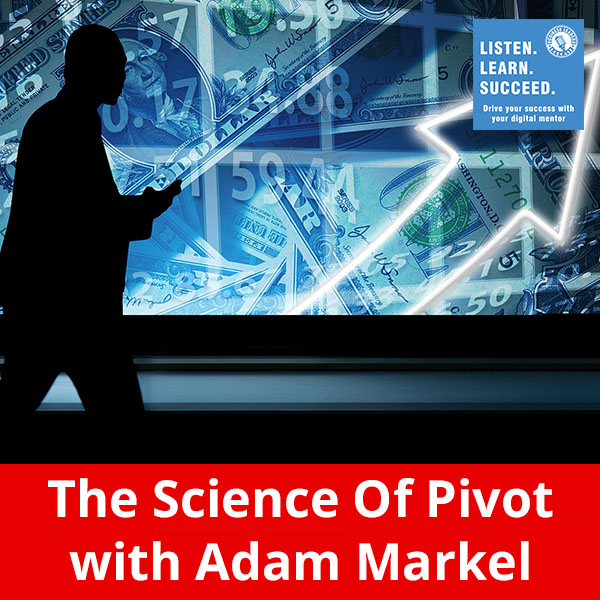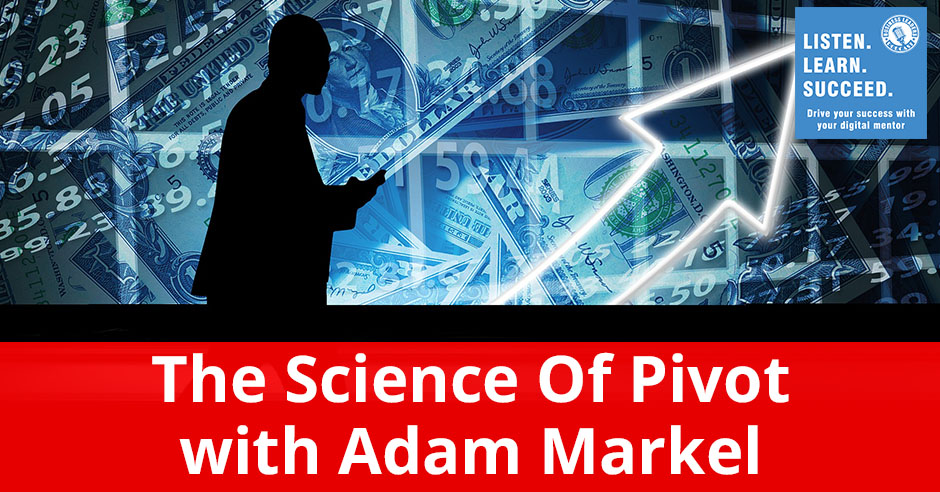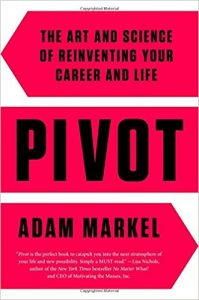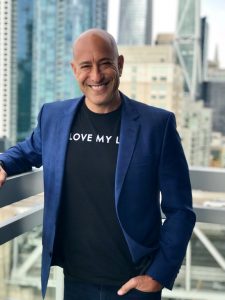The Science Of Pivot with Adam Markel


We’re living in an age of disruption and transformation. If you’re not innovating ahead of that change, you end up like a lot of famous or once famous companies that don’t exist anymore. Adam Markel, bestselling author of Pivot: The Art and Science of Reinventing Your Career and Life, serves a community of business leaders and entrepreneurs by helping them reinvent their business landscape as well as anything they like to change in their lives. His main goal is to create a culture of empowerment where people feel emotionally safe to be creative and innovative.
The Science Of Pivot with Adam Markel
 Pivot: The Art and Science of Reinventing Your Career and Life
Pivot: The Art and Science of Reinventing Your Career and Life
We’re operating remote in Tampa, Florida at CEO Space and we are with Adam Markel. He is the best-selling author of Pivot: The Science of Reinventing Your Career. I’ve read the book personally and I’ve given it to both of my kids. If you haven’t read it, I would recommend that you put it on your reading list. He was picked up by Huffington Post last year as one of the top speakers that you must see. Welcome to the show, Adam. Thanks for taking the time.
Thank you, Bob. It’s a pleasure to be here.
Tell me a little bit about your business and who you serve.
Our company is called More Love Media. We serve a community of people who are business leaders, people that are some entrepreneurs and others that are running larger organizations, some quite large organizations who are reinventing. When I say reinventing, you are right, the book Pivot is the art and science of reinventing aspects of your business and your personal life as well. It’s not a term that says things are wrong necessarily and we’ve got to change them because I’m desperate for a change. We’ve got people, whether it’s their health or something in their relationships, either business or personal relationships that they are urgent about making a change, that’s for sure, but we’ve got a lot of people that are simply looking at the landscape ahead and seeing what’s happening right now, which is that we’re living in an age of disruption and an age of transformation. If you’re not innovating ahead of that change or that disruption, you end up like a lot of famous or once famous companies that don’t exist anymore.
I think about the CEO that’s in this. There’s a show on TV about Fortune Fire where they take a piece of metal and turn it into something useful, and then you pound that thing out and you have tempered steel at some point. I think the CEO’s nowadays feel like they’ve been tempered a lot. In that timeframe, you work with organizations and try to develop a culture inside the organization that’s heart-centered. Let’s talk about that for a bit.
We call it heart space in the workplace, which is interesting when I sit down with a CEO and talk about that, but this is really about a culture of empowerment, of creating a culture where people are more free and feel emotionally safe to be creative, to be innovative. It’s important that a company these days remain ahead of that cycle of change and not manage the change, but utilize it and look ahead at where it is that you can innovate. You have to have a culture that promotes that. You have to have compensation that rewards that behavior. In many companies, there are structures and other things, the culture that’s set up, does not reward innovation even though it’s part of the company’s mission. The things that are pronounced from the top down that they want to see the company innovate and be agile, be flexible, and yet the structures of the company are anything but that.
I think about for that for the listener out there that’s running a company and go, “I feel the need to innovate and I’ve been told I should innovate, but I haven’t got a clue. I’m so busy in my day to day. I’m so busy in the company I have little time to think about on the company or innovating in the company.” If you are involved in working with the company, what do you do to help them get toward that innovative space?
I was a CEO for the better part of about seven years.
People don’t know what you were the CEO of and how many people you reached. Can you touch on that for a minute?
The number of people we touched was into the millions because I ran what was the largest personal and business development company in North America. We had 80 employees and a number of other contractors and vendors and people that we touched outside of that, but we were working with about 30,000 new students a year, and that’s a lot of people in a big ripple effect. That’s how we felt about it. These were folks that were wanting to utilize change, learn how to get ahead of the curve of change. My theory about it is that there are two kinds of changes. One that’s by design, changes that we design and then build something, and there are changes that are by default, where one day something changes and you go, “How in the world did that happened?” It’s like a smack upside the head.
It’s important that a company these days remain ahead of that cycle of change.
It could be that your business starts to go sideways, your competition starts to eat your lunch or there’s other things that happen that we don’t expect. We’ve got to have a mindset around looking forward and seeing that the only thing that doesn’t change is change itself. Whether it’s an oxymoron or it’s a paradox or a riddle of the universe, that change is a constant. Where I see companies make the mistake and not companies but individuals, is that they resist change, that they want to maintain the status quo. If you ask a company, “Are you looking to maintain the status quo? Are you playing your business on defense only?” They’ll never say yes, but the culture says otherwise. The employees will say otherwise. If you’re surveying the people who are on the front line, they will tell you that fear runs rampant, that there’s a culture of fear.
What do I mean by that? A culture that does not reward risk taking, calculated risk taking. In fact, what it does is it says, “Don’t make mistakes.” When people are afraid of making mistakes, you do not have innovation happening. Really interesting, I was reading an article the other day about this, that mature companies have a way of moving forward in their business model. System’s repeatable processes that produce a predictable result, and companies that are starting up in a space. Start-ups, they have a very different mantra. They need to figure out a business that’ll work before they run out of money. Their run rate, they’ve got certain runaway and when that money is gone, unless somebody acquires them or they get an infusion or convince some other friends or family to put more money into this thing, they’re done, they’re toast. The urgency is different and the reward is different. To me in a mature company, you still got to have that startup. There’s got to be some element of the startup that still lives inside of that company. That’s what innovation to me, it looks like.
From your experience, who’s the chief cheerleader of that mindset?
There’s no question. It has to be the CEO. CEO’s get a bad rep, and some for good reason. It’s like anything else. There are parents that are great parents, great husbands, great wives, and there are those that are still reading the manual. They’re going to make mistakes and it’s not always going to work out well, so a great CEO is in short supply. A good CEO is also in short supply, and the mediocre ones are in abundant supply, and that’s why business is so tough.
You got to be the one to cascade those messages from the top. You got to be able to create vision. That was the toughest thing that I ever got asked, especially when I started out as a CEO, was what is your vision? Then I read somewhere that when Steve Jobs and when Michael Dell and Bill Gates as well, they asked “What’s the toughest thing about being a CEO?” It’s the question of creating a vision, holding a vision, because that vision also, it’s not like its vision for the next 50 years, because the world is changing too rapidly. Pace of change. That’s why the pivot skills and what we bring to a workplace and what we bring executives and into leaders like CEO’s is the ability to not think outside the box, but to obliterate the box, to be able to act outside the box, because action is the most important thing to control our thoughts. Usually people are thinking, “I’ve got to start with my thoughts and that will create my actions,” but it’s actually the other way around.
I’m a CEO listening to this episode and go, “I need Adam to come into my organization.” What should a CEO expect when you walk through the door the first time?
A hard time. It’s interesting because in my role as in running that company, I was also one of the trainers. I was the head trainer and I created a lot of curriculum. I love doing that, so I’m a teacher first and foremost. That’s our company. More Love Media is in essence, a teaching company. We don’t call ourselves consultants. Sometimes I will do keynotes, I’ll speak to large groups, and then we’ll end up working with those companies in culture creation or working with their sales culture. A lot of times the culture that is more obviously showing what’s wrong with the more systemic problems with a company shows up in the area of sales and marketing more typically, so we’ll work in those areas.
 The Science Of Pivot: When people are afraid of making mistakes, you do not have innovation happening.
The Science Of Pivot: When people are afraid of making mistakes, you do not have innovation happening.
When I walk in the door and I sit down with someone who’s the CEO, I want to know what their deepest challenges are. I’ve probably been there, I think that’s what gives me a little bit of a leg up because I can understand what it’s like to wake up in the middle of the night and worry about cashflow or worry about even making payroll at times. I have been there and I understand that. I understand what it’s like to also wonder whether the culture with what’s going on inside the company is almost like termites. It’s a silent thing that’s eating away at the foundation of the company. When you’re disconnected from the workforce or when you’re not knowing what it is that is not just going on, but how people are feeling inside the company about what the company is doing, it is like a termite. It can become toxic. Learning how to deal with that toxicity or identify it, how it is that you are attracting the talent to be on the bus and also welcoming and having a process to have people exit the bus that are not meant to be on the bus.
I think these are day to day issues. I call those the terrible Ts: toxicity and turnover. They are again more subtle in many ways and quantifying that, quantifying the cost to a company when there’s that toxicity, that has to be measured where that exists, and the turnover which can be measured but often isn’t part of the bottom line analysis, I think these are things to address. I also work with CEO’s about how it is that they cascade the message because you said earlier, where does this all come from? It starts at the top. For a CEO to be great and not merely good and certainly not mediocre, they have to be great at communication. You’ve got to be effective. Steve Jobs was a great communicator. Not everybody liked him, liked his style, but his product launches were prolific. When he made public pronouncements, people listened.
That’s what a CEO, whether they’re comfortable in front of a microphone or on a stage in front of hundreds or thousands of people or on a Zoom in front of their company, as I was doing often quarterly meetings with our company entirely in three different countries, to be in front of your company and to be vulnerable, to be real, to be transparent in many ways, is what that workforce is looking for. They’re looking for that brand of leadership. Sometimes I’ll ask a CEO, how effective are you? How comfortable are you at communicating your message, cascading your vision? If they’re not great at it, that’s one of the areas that we help them, is to be able to be more effective at articulating their message and conveying it in a way that is not robotic, but it’s heart-sent where the company, everybody in the company, senior leaders on down know you mean business.
The thing that strikes me is I’ve heard you speak a number of times, and the people that are listening don’t know, but what they really don’t know is the size of your audience experience. You’re articulate now and I’m sure everybody’s going, “He was born that way.” Let’s talk a little bit about your journey to being an effective speaker. I believe personally that there’s a disconnect in how senior leadership views speaking skills. You either have it or you don’t, and if they have coaches and consultants on every other area of the business, that they don’t have a coach or a consultant in the speaking side strikes me is missing opportunity for them.
I’ll start with the part about being born to do this thing. I’m an introvert and I say that the audience only just recently. In an answer to your question, I was a lawyer for eighteen years. I was a litigation attorney. My stomach would turn into knots every time I had to stand up in court and speak to the judge. I forced myself to do that, because it was in service to a higher purpose, a greater mission, which was to protect and defend and care for the rights of my clients. When I reinvented my career, my life after eighteen years of law practice and started to pursue this other area, I had to face that fear. I had to face the idea that “Who am I to stand up in front of people?” Or “That’s not my greatest skill set. I’m a thinker. I know how to solve problems. I know how to motivate people quietly, one on one. That’s where my comfort zone is.”A lot of other CEO’s are the same way. They don’t want to be the face necessarily. They don’t want to be the Jack Welsh or Steve Jobs or whoever it is. They want to be more quiet, more humble even, in their leadership style. The truth is why I say when I walk in the door sometimes, it’s a confrontation of sorts.
Everything that we have is what we’ve settled for.
I want to understand what’s created the status quo or what’s created what they’ve got. Everything that everybody has, whether you’re in a leadership role or in some other area of your life, everything that we have is what we’ve settled for. A CEO has settled for some level of what’s going on. For everything that’s happening in his or her company, they’ve settled for it. To me it’s always about what’s the next thing. What is intolerable? What’s something that you’re no longer willing to settle for? If what you’ve done so far has produced everything you’ve gotten, it’s clear that something has to change. Sometimes it means stepping forward and not having any false humility or feeling like you have to be more of a quiet leader, but that you’re willing to stand in the fire and be heard and learn as you say, practice as you said, to be a more effective communicator. Folks that are working in that company can look at you and say, “I know this guy’s not necessarily wanting to do this. It might not even be comfortable for him or her to do it, but they’re doing it anyway. If they can be uncomfortable, then I can be more uncomfortable.”
I think about the incidents of speaking with the advent of Zoom and others. There may be a thought that used to be, I didn’t have to speak in front of my employees so much. Then you think about the video conferencing and how frequently it occurs and I think about the presence and selection of words and how you come across is now much more in demand just from frequency. I think about the CEO and I used to pitch in the military a lot and speaking skills were absolutely critical to get across the point. Before I forget, how do they reach out to you? How do they find you on social media?
That’s pretty easy. We got a podcast they might enjoy as well. It’s called the Conscious Pivot Podcast. It’s this idea that to do better, we’ve got to be able to create and maintain better thoughts. Truth is, we are all growing or we’re dying. That’s the way it is in nature. We’re out in nature right now, so everything that we’re seeing around this is in a state of growing, and the stuff that’s not growing is in the state of decay. Businesses are the same way. We are the same way in our businesses as well. We’re either growing or we’re in decline. To me, how you bring a level of consciousness to that state of growth, to that constant never ending improvement of yourself and of your business and your leadership skills or speaking skills, all those things is important. They can check out the podcast AdamMarkel.com/podcast. That particular site also has information about some of the ways that we serve the community, serve leaders, serve leaders that want to speak more effectively, that actually want to get coached, get mentored in that speaking arena. If there’s one thing I would say that I’d love people to know is that you just don’t have to go it alone.
Steve Jobs for example, who’s very well known, and in many ways more well known for his speaking than for almost anything else, your story is profound, the innovation you brought to that company and the success of the companies is incredible, but if he had never spoken, if he had never been the face, if he had never stood on those stages to introduce the iPod and the iPhone and those things, we wouldn’t know him. We wouldn’t have the respect that we do. He wouldn’t necessarily have been able to lead that company through the dark times that he did and be able to get so many people to rally behind his message. AdamMarkel.com is where people can find me. They could find me on LinkedIn as well under the same name Adam Markel. Find out more about our company, More Love Media, as well. Those are probably the best ways for folks to reach out who.
We’re going to shift gears here a little bit. This is where I get to quiz you to death. I love this part. For this part, what’s the most recent book or most influential book that has altered your perception on being a CEO or how you run your business?
It’s not a recent book. I read Simon Sinek’s Start with Why. I hope anybody that’s listening to this, watching this has either read it or will read. Simon Sinek’s Start with Why. I love Isaacson’s biography of Steve Jobs. That’s a big book. I’m not the fastest reader in the world, but I enjoyed it and took my time through it. It’s a book on business for sure. The personal book, there’s a lot of things including good speaking. It’s a rollercoaster. If you’re predictable, you’re boring, so the book has a lot of ups and downs because Steve Jobs had a lot of ups and downs, but the business teachings in the book are phenomenal.
For you, looking back over your career, we all experience a failure or what may appear to be at the time a failure. How has that failure serve you or your company best or set you up for future achievement and why?
Failure is something that from the time that were very young is trained out of us. It’s because compensation drives behavior. In the case of being a child, our compensation is love, it’s approval, it’s acceptance from our parents and our peers and our teachers. When we make mistakes, we’re disapproved, punished even sometimes. It’s the opposite. What ends up happening in many ways is that we grow up thinking that failure is a terrible thing and we try to avoid it at all costs. If there’s anything that I could say I’ve learned from and done my best to model in all the organizations that I’ve either run or been a part of. It’s that failure is not even the word that I think of. I think of finding out. Failure is finding out to me. I can find out with every failure I’ve made, I’ve had so many of them. I find out what doesn’t work. The beautiful thing about what knowing what doesn’t work is that when you know it doesn’t work, you know what does work.
 The Science Of Pivot: Failure is something that from the time that we’re very young is trained out of us. It’s because compensation drives behavior.
The Science Of Pivot: Failure is something that from the time that we’re very young is trained out of us. It’s because compensation drives behavior.
Sometimes when I sit down with a leader, I’ll have them do a t-chart. Create a t-chart and on the left-hand side of the t-chart, write all the things that you know don’t work right now, and they can list ten things that don’t work. “This person and this department,” all of the things that don’t work. Then I say, “Great,” so that’s easy. “I want you to take a look at everything on the left side and write down how it informs you on the right-hand side of that chart what does work, because when you know it doesn’t work, you also know what does work.” You get so much clarity out of that one simple exercise, looking at what doesn’t work, the failures in other words, and see where that informs your understanding and your clarity about what does work. It’s profound. I’ve used that in my company and companies and still do to this day. It’s great.
If you could take in and put an ad out on your message on page one of the local paper or whatever, sharing your message, what would it say and why?
This might sound a bit odd I guess in a business context, but I really believe that everything that we want is rooted in love. Whether the success of a company, the success of our own personal lives in our relationships, everything’s rooted in love. For us to have a better experience, whether personally or in our leadership roles, we have to do the one thing that from the time that we’re born to the time that we die. We’re in an unfolding state of learning how to love ourselves. That is beginning, middle and end of the story. When we are learning that, when we are willing to put the work in and learn how to love ourselves more unconditionally, everybody’s a beneficiary of that. We’re a better leader, we model something that everybody’s looking for, whether they think they want. Money’s important, success and all the facets of it are important, but at the end of the day, people are looking for that. They want to know they’re okay, soul-wise, heart and spirit-wise. They want to know they’re okay. Loving yourself is the best work that we can do for ourselves as well as how it impacts everybody around us.
What’s the best allocation, either of time or an issue, that’s helped you or your company most?
This is about resilience. For a business leader today to be successful, they have to be resilient. I love this Harvard Business Review article about corporate athletes. They compared athletes, the best athletes in the world, the ones that have won Olympic gold medals and won the biggest golf tournaments and everything else, with corporate executives and high achievers. They found something incredible that’s in common with those folks. The ones that had succeeded in the sporting arena were faster to recover than the ones that finished second place or third or didn’t make the podium or whatever it is. They were able to recover more quickly in between points, in between games, and in between seasons. They were more resilient.
They found that in the corporate sector, it was the same thing that rituals for recovery and resilience were key. That’s part of what when we come into a company or when I speak on stages and keynote, oftentimes that’s what I’ll speak about, is the importance of resilience. Just a moment ago, when we’re talking about self-love for example, that’s a practice of resilience. It’s a ritual to be able to recover more quickly, because the season for an executive doesn’t end. It’s evergreen, and it can 40 years of evergreen game after game. Professional athletes, they get to rest, they get to take a season off, they get to recover physically, recover mentally, emotionally. CEO’s are going almost 24/7. It’s never not on your mind when you are a CEO. [3:00] in the morning, you get up to go to the restroom, it’s on your mind.
What do you think is your most unusual habit or what others may consider out of the ordinary that’s helped you and your company most?
The first few minutes of your waking time, the beginning of the day, is when your mind is the most fertile.
This is what I’m known for. I’ve taught this one waking ritual. I really believe that the first few moments, minutes of your waking time, the beginning of the day, is when your mind is the most fertile. The soil is the most fertile to what you plant in it. Since I know that creating an unconditional love is the most important end game for all of this, I start right there at the beginning of the day. I wake up, that’s the first thing I do and I always make a joke about that. Whether it’s in so many contexts, I’ll ask people and, “I ask you Bob, will you really wake up tomorrow?” It’s your experience, because if it’s not on your calendar, it’s not going to happen, so good for you. You wake up, and in that moment waking where you can have a conscious realization of the fact that that’s not guaranteed, that’s not promised. As you take that first waking breath, there will be people who are taking their last breath. There will also be babies being born, taking their first breath as well. People point that out to me all the time, and that’s a blessing, so you can be grateful. It’s waking up and being grateful in the moment right then and there for that breath. With every challenge or every “problem” or every failure thing that you might be dealing with, you can still have a genuine moment of gratitude there. Then I say some words right from my bed or when my feet hit the floor, I say these words. I say, “I love my life. I love my life. I love my life.” That’s what people know me for probably more than anything else.
That’s not a bad way to start a day. Over the past three years, what belief or protocol have you established in your company that is most impacted you or your company’s success?
It is this idea of creating rituals for resilience. Everybody in our company is required. It’s not something we have to police to take time out during the day to take a twenty-minute walk, but folks go out in groups and they walk. We live and work in our offices in San Diego, so it has a lot of nice greenery around. It’s maybe not that easy if you’re living in a place where you got to northeastern. I’m from New York, so they’ve had for northeasters in the last four weeks or something like that. It’s been incredible, so it’s not quite that simple, but we’ve got to take time. Maybe it’s for mindfulness, just to take twenty minutes of stillness. Away from phones, away from devices, away from social media, and be quiet and still, but something that you do to take care of yourself each day, just twenty minutes even, is key.
I think that good things come to you when you’re out of your chair and away from the computer and you’re moving physically. I think that a lot of issues that I have resolved themselves when I’m doing that thing, so that’s great advice. What advice would you offer to a new CEO that’s assuming the role of CEO for the first time?
It’s to get mentorship. This is one of the mistakes that I made. When we talk about failure in my past, it was thinking that as a CEO, it’s the toughest job is why it should be rewarded the way it is. You are very much on an island of sorts. Yet even though you may be on an island or perceive that you are on an island, you must get mentorship, and I didn’t at the beginning. I thought that was a sign of weakness. That would be a sign that I wasn’t qualified or was a fit. Whether it’s to hire someone, there are great organizations that coach our company, our company support CEO’s in that regard, there’s a stakeholder coaching and in all kinds of good organizations that will support CEO’s. To receive mentorship or coaching so that you can have this objective, this ability to run things past someone else and to even be vulnerable in a way that you don’t feel like that you can necessarily around your immediate peer group. VISTAGE is a great group to get into a group where you’re around other CEO’s and get some mentorship from more seasoned CEO’s even. These are great things for a new CEO to do.
For you, what do you think is the most common misconception about you or your role as CEO?
It’s probably a blind spot for me. I don’t know what the misconception would be. People say I’m extremely heart-centered, so I guess the misconception would be that I don’t get angry or upset or that I don’t have a lot of personal development work that I’m actively engaged in. Just because you are sharing a vision about what the best self looks like, I like to share what my best self is working on, doesn’t mean that every day isn’t its own challenge, every minute in fact.
 The Science Of Pivot: We don’t leave people behind, and that vigilance can really wear you out.
The Science Of Pivot: We don’t leave people behind, and that vigilance can really wear you out.
I think about your persona, how you present yourself. I’ve seen you speak and I don’t think anybody would ever think that when you ever had a challenge, that you ever didn’t know how to speak or you were ever afraid of standing in front of an audience. I think about that and the backstory would suggest otherwise. Looking back over the past three years or what would or should you have said no to and why?
I probably should have said no to myself more. I have a team now are around me that they say no to me. I’ve invited them and ask them and I reward them for doing that, for saying no, because I’m one to want to squeeze so much out of a quarter of a day even. I’m always sucking the marrow out of everything or trying to anyway, and that can wear thin on other people and on the organizational structures itself. Saying no to myself and having people around me that are willing to stand up and say no. We think it’s great. This is a great idea. Instead of it being in the in Q3, it’s going to be in Q2 of the following year, if at all, but that’s where we would like to put it. Then I take a deep breath and go, “Okay. Yes.” I want to push back, but more often than not, the truth of the matter is I say yes because they’re right.
As you operate day to day as a CEO, is there a personal self-habit or self-talk that keep you and your company focused?
It is a vigilance of sorts, and it’s an interesting topic, vigilance, because I think part of why we’re run down is that I run in that vigilant state. I’m constantly guarding. I was a lifeguard back in my early twenties and made a lot of rescues back then. We didn’t lose anybody at our field and I have a mantra that I repeat to myself that nobody goes down in my water, not on my watch. We don’t leave people behind, and that vigilance can really wear you out. I’m looking more to be guided these days than to be on guard. I think there’s a balance point that I’m exploring this middle ground between being on guard and being in surrender, so to speak. That blind faith or faith, I want to say blind faith, but that’s where I’m playing in that territory.
For you, is there a quote that you use frequently or find meaningful?
The one I shared earlier, “I love my life,” is the quote that I find the most meaningful, because it’s not the statement of “My life is perfect or I love everything about my life, or I’m not needing improvement.” It’s a statement of what I want and what I intend. You can’t see the whole picture. Our faces are pressed up against the plates, so close, we do not see the whole picture. There’s a lot to love that we don’t. I state that as an intention, as a direction for myself to see the bigger picture.
This has been a treat. I appreciate you sharing your insight and perspective. Adam, thanks so much for being on the show.
Thank you, Bob. Thanks for having me.
About Adam Markel
 Adam has a love for helping people create massive transformation in their lives, which is rooted in his personal practice of growth and constant, never ending self-improvement. Adam’s journey of reinvention has led him to living a life he loves, where he’s actively sharing his unique gifts, making a positive impact and leading from his heart. He is a magnificent example of what it means to “walk the talk” and live with integrity, leadership, tenacity and immense gratitude. These qualities and experiences are what make Adam a wildly charismatic, sincere and riveting speaker.
Adam has a love for helping people create massive transformation in their lives, which is rooted in his personal practice of growth and constant, never ending self-improvement. Adam’s journey of reinvention has led him to living a life he loves, where he’s actively sharing his unique gifts, making a positive impact and leading from his heart. He is a magnificent example of what it means to “walk the talk” and live with integrity, leadership, tenacity and immense gratitude. These qualities and experiences are what make Adam a wildly charismatic, sincere and riveting speaker.
As someone who is committed to physical, spiritual and emotional fitness and well-being, Adam Markel is a shining example of what it means to lead a healthy, fulfilling and authentic lifestyle. At the origin of his personal and professional success are his carefully curated daily rituals, some of which include practicing yoga, surfing, morning green juices and creating space for meditation. It’s through these powerful habits that Adam builds and nurtures his energy, passion and peace of mind.
A Recognized Expert…
in the integration of business and personal transformation, Adam has been interviewed by: Fox News, Newsday, The New York Post, The Wall Street Journal and more.
Prior to his work with New Peaks, Adam spent two years teaching junior high school English, founded a successful commercial real estate investment firm and went to law school — where he passed the New York State, New Jersey State and Federal Court bars.
After law school Adam founded a multimillion-dollar law firm specializing in finance, commercial and employment litigation. Over the course of his 17-year practice, Adam represented over 1,000 matters with hundreds of clients including Citibank, Wachovia and HSBC.
Links Mentioned:
- CEO Space
- Adam Markel
- Pivot: The Science of Reinventing Your Career
- Conscious Pivot Podcast
- AdamMarkel.com/podcast
- AdamMarkel.com
- Adam Markel – LinkedIn
- Start with Why
- Steve Jobs
- Harvard Business Review article about corporate athletes
- VISTAGE
Love the show? Subscribe, rate, review, and share!
Join the Business Leaders Podcast Community today:
- businessleaderspodcast.com
- Business Leaders Facebook
- Business Leaders Twitter
- Business Leader LinkedIn
- Business Leaders YouTube
The post The Science Of Pivot with Adam Markel appeared first on My podcast website.